| Srl | Item |
| 1 |
ID:
157412
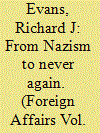

|
|
|
|
|
| Summary/Abstract |
Defeated regimes are not only swiftly removed from power but often immediately erased from memory as well. When Adolf Hitler’s “thousand-year German Reich” came crashing down in 1945 with the Allied victory in World War II, reminders of the 12 years of its actual existence were hastily scrubbed away as Germans scrambled to adjust to life after Nazism. Stone swastikas were chiseled off the façades of buildings, Nazi insignia were taken down from flagpoles, and, in towns and cities across Germany, streets and squares named after Hitler reverted to their previous designations.
|
|
|
|
|
|
|
|
|
|
|
|
|
|
|
|
| 2 |
ID:
108929
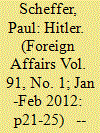

|
|
|
| 3 |
ID:
153008
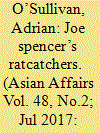

|
|
|
|
|
| Summary/Abstract |
During the Anglo-Soviet occupation of Persia (Iran), the Tehran-based Defence Security Office was responsible for protecting from Nazi subversion and sabotage three potential strategic targets: the vital oilfields, pipelines, and refineries of Khuzistan; the Lend-Lease supply route between the Persian Gulf and the Soviet Union; and the security of the Persian polity itself. Against all odds, under the command of Lt Col E.L. ‘Joe’ Spencer, this small but effective British/Indian security-intelligence unit succeeded in neutralising the Nazi threat, in capturing all German operatives on Persian soil, and in maintaining the security of a territory five times the size of Britain.
|
|
|
|
|
|
|
|
|
|
|
|
|
|
|
|
| 4 |
ID:
119757
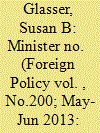

|
|
|
| 5 |
ID:
138492
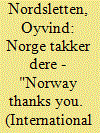

|
|
|
|
|
| Summary/Abstract |
IN THE NORWEGIAN CAPITAL'S largest cemetery, there stands a monument to Soviet soldiers with three words on the pedestal, "Norge takker dere" - "Norway thanks you." These are simple words but they express the deep feelings that the Norwegians had after the Soviet army, in October 1944, drove the invaders not only out of the Soviet Union's own Arctic areas and Kola Peninsula but also out of Eastern Finnmark, a Norwegian province that in those days bordered the Soviet Union and today borders Russia.
|
|
|
|
|
|
|
|
|
|
|
|
|
|
|
|
| 6 |
ID:
117374
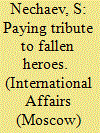

|
|
|
|
|
| Publication |
2012.
|
| Summary/Abstract |
It is true that Austria played a special role in the war. There is an earnest discussion of this subject in Austrian society with no so-called "awkward topics" barred. Whereas Austrians were inclined to regard their country as a mere victim of Germany's aggression, the current discussion shows that there were also many Nazis among the local people. This awareness makes for a more impartial approach to studying historical material and lets the country's political leaders use the useful lessons of history to inculcate in young people intolerance to racism, nationalism
|
|
|
|
|
|
|
|
|
|
|
|
|
|
|
|
| 7 |
ID:
122818
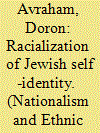

|
|
|
|
|
| Publication |
2013.
|
| Summary/Abstract |
While excluded from society and subjected to discrimination under government measures, German Jews under the Nazi regime during 1933-38 had conducted a public discourse regarding their collective identity. Acknowledging the failure of emancipation, Zionist and Orthodox Jews used racial vocabulary and concepts to produce an independent stance and to define political ends. Such an effort, however, did not begin during the 1930s. It was a reinforcement of racial ideas prevalent among German Jewish scientists since the late 19th century. In the 1930s, though, this "racialization" turned into a popular one, thus forming Jewish public opinion and political aspirations. It functioned as a means to respond to the inferior racial status and exclusion imposed on German Jewry by the Nazis.
|
|
|
|
|
|
|
|
|
|
|
|
|
|
|
|